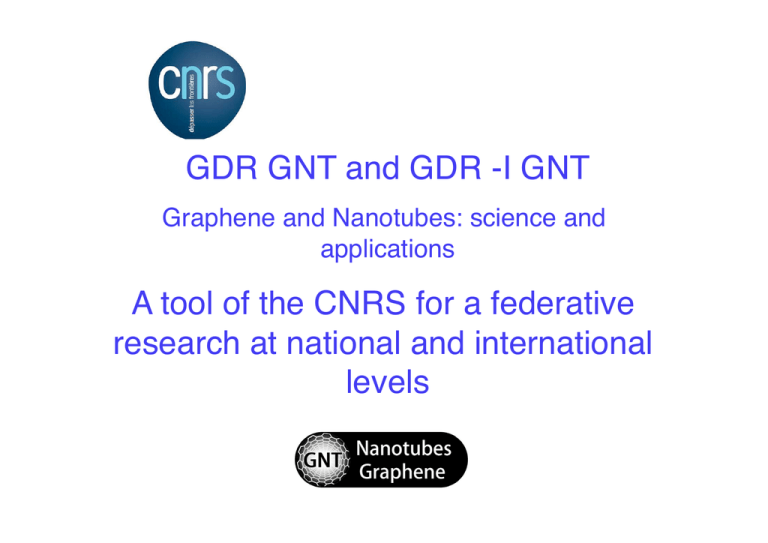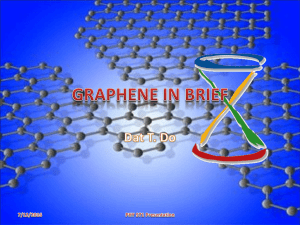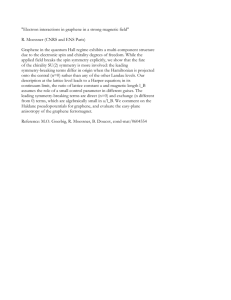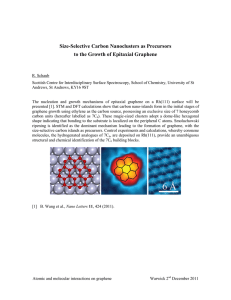GDR GNT and GDR -I GNT A tool of the CNRS for a federative
advertisement

GDR GNT and GDR -I GNT Graphene and Nanotubes: science and applications A tool of the CNRS for a federative research at national and international levels What is a GDR, what for? GDR = Groupe De Recherche (Group of Research) •Group of teams gathered together for organizing a scientific community working on an emerging research field and undertaking a cooperative research on targeted priorities •Financial grant from the CNRS for networking, not usable for research •Additional grants from agencies fro specific actions Objectives: - open platform for promoting exchanges, initiating research projects - sharing samples and materials, facilities, expertises - training and mobility of phD students and young scientists - communication and dissemination Activities of the GDR •Organization of annual meetings, thematic workshops and schools •Support to mobility and training •Grants to promote exchanges between partners for performing experiments, calculations or discussions •Grants for PhD students for attending scientific meetings supported or organized by the GDR •Partner and co-organization of scientific meetings Description of the structure •The successive groups 1998- 2003: First National GDR on carbon nanotubes 2004 - 2008: Second National GDR and First International GDR-I: Nano-I •Present Graphene and Nanotubes: Sciences and Applications: GNT GDR + GDR-I created in 2009 •Three scientific priorities 1- Structure and properties of the individual nano-object 2- Properties of graphene and nanotube based devices 3- Chemical manipulation and fabrication of devices The Partners •National GDR 50 teams issued from CNRS, Universities, CEA, ONERA, Thales... •International GDR (GDR-I) French teams: LEM (Cnrs-Onera), L2C (Montpellier), I. Néel (Grenoble),CRPP (Bordeaux) European teams: FNRS and UCL Louvain la Neuve (Belgium) University of Cambridge, Great Britain CSIC, Spain (Zaragoza, Barcelona, Madrid, San Sebastian) Freie Universität Berlin, Germany University of Athens, Greece Canadian team: Université de Montréal •Associate teams: TUK (Helsinki), GPI (Moscou), U. Karlsruhe... 60 teams, 450 scientists, 120-150 PhD students, about 1/2 on graphene Organization •General coordination - A. Loiseau •Deputy coordinators J.-L. Sauvajol, D. Mayou (France) J.C. Charlier (Belgium) •Scientific council Theme 1: L. Cognet -F, D. Mayou-F, J.L. Sauvajol-F, A. Ferrari –GB, S. Reich-G Theme 2: H. Bouchiat -F, S. Roche-F, J.-C. Charlier-B, R. Martel-Ca Theme 3: A. Bianco-F, E. Dujardin-F, A. Pénicaud-F, W. Maser-Sp, N. Tagmatarkis-Gr •Secretary and Communication Web site: C. Ewels –F Secretary, electronic alerts, news letters: H. Amara-F Web site: http://www.graphene-nanotubes.org/ Meetings organized by the GDR •General annual meeting: 4 full days in an unique convivial place Belgium 2005, France 2006 and 2007, Spain 2009, France 2011 •International Conference on chemistry created by the GDR: ChemOn Tubes 2006 Arcachon-F, 2008 Zaragoza-Sp, 2010 Arcachon-F •International thematic Schools 1) Carbon Nanotubes Cargèse 2006, 2) Graphene Cargèse 2010 •International Conference on Science and applications of nanotubes: NT , NT8 in Montpellier 2008, NT10 in Montréal 2010, NT11 in Cambridge 2011 •International Conference on Graphene organized by the GDR with the Phantoms Foundation Graphene 2011 in Bilbao 11 – 15 April 2011 Annual Meeting 2011 at Dourdan •150 attendees, half of students •Ingredients of the scientific program: - tutorials, invited and contributed talks - posters - 2 round tables on nanotubes sorting and on synthesis of graphene •Special care to students / young researchers - very low fees for students - invited talks (1/6) and most of oral contributions (2/3) - session of questions from students •Special attention to posters - clips presentation presentation - 2 or 3 attractive and convivial sessions sessions •Free ee time d dedicated edicated to in informal nformal dis discussions scussiions s Arcachon, France April 11 – 15, 2010 International Meeting on the Chemistry of Nanotubes and Graphene Scope All sessions will be devoted to both graphene and carbon nanotubes Functionalization, dispersion, sorting Composites, foams, coatings Energy storage, conversion, harvesting Nanomedicine, biomaterials Functional materials Catalysis, filtration, membranes Organic electronics London Paris Arcachon Madri d Chemontubes 2010 : 4 days, and 2 poster sessions ca 10 invited lectures + 40 oral presentations 250 participants Frankfurt Milano NT’08 29th June to 4th July 2008 Le Corum, Montpellier Organizing committee issued from the GDR-I Annick Loiseau (LEM, Chatillon, France), J.L. Sauvajol Jean-Louis Sauvajol (LCVN, Montpellier, France) Jean-Christophe Charlier (PCPM, Louvain, Belgium) Pierre Petit (ICS, Strasbourg, France) Co-organizer David Tomanek (MSU, USA) National Committee J.C. Charlier Robert Almairac, Eric Anglaret, Vincent Jourdain, Christophe Goze (LCVN,Montpellier) Serge Lefrant, Jean-Charles Riquier (IMN, Nantes) Philippe Poncharal (LPMCN, Lyon) Stéphan Roche (CEA, Grenoble) D. Tomanek Some Numbers •750 attendees from 55 countries: the largest conference on NTs to date •1/3 attendees were granted PhD students •5 key notes, 12 invited talks, 40 oral talks and 500 posters •3 satellite meetings on computing metrology, bio-applications •1/2 oral contributions presented by young researchers •20 poster awards Conferences & tutorials accessible on the web site: http://www.cnrs-imn.fr/NT08/ NT'10 Montréal Canada June 27 - July 2, 2010 www.nt10.org Local Organizing Commitee Richard Martel Paul Finnie Jacques Lefebvre Benoit Simard -540 attendees -700 posters -4 satellite meetings including the 1st one graphene •22 lecturers, 88 participants (more than 150 applications) •10 senior scientists + 78 PhD students and post-docs •30 from France + 10 from GDR-I DATE 11-14 April 2011 COMMITTEES Organizing Committee TOPICS •Growth, synthesis techniques and integration methods • Spectrocopies (Optics, Raman, EELS) and microscopies (HRTEM, STM, AFM) • Quantum transport • Chemistry of Graphene • Spintronics, Magnetism • Theory and simulation • Nanoelectromechanical systems • Applications (gaz sensors, composites, nanoelectronic devices...) Antonio Correia (Phantoms Foundation) Annick Loiseau (ONERA-CNRS, France and GDRI, International Research Group on Graphene and Nanotubes) Stephan Roche (CEA, INAC, France) Scientific Committee Tsuneya Ando (TITECH, Tokyo, Japan) Eva Andrei (Rutgers, State University of New Jersey, USA) Hélène Bouchiat (LPS Orsay, Paris, France) Hui-Ming Cheng (Institute of Metal Research, Chinese Academy of Science, China) Jean-Christophe Charlier (University Catholique de Louvain, Belgium) Toshiaki Enoki (TITECH, Tokyo, Japan) Vladimir I. Falko (University of Lancaster, England) Andrea Ferrari (University of Cambridge, England) Paco Guinea (ICMM, Madrid, Spain) Tony F. Heinz (Columbia University, USA) Chun Ning (Jeanie) Lau (University of California, Riverside, USA) Loh Kian Ping (National University of Singapore) Thomas Seyller (Universitat Erlangen-Nürnberg, Germany) Young Woo Son (Korea Institute for Advanced Study, Korea) Summary of GDR actions •GDR GDR-I has a high visibility via its actions at the service of the community •GDR / GDR-I : an efficient network for organizing scientific meetings and schools, for sharing and promoting its researches •Particular attention paid to young researchers: mobility, training, dissemination •Scientists community gathered together on nanotubes since 13 years is a robust and efficient basis for developing research on graphene - long time scientific expertise on carbon nanostructures - a large ensemble of numerical and experimental tools - a common know-how and exchange-how in different fields Research and task force on Graphene •Synthesis •Structure and properties •Chemical manipulation •Fabrication and study of functional devices Synthesis 1 : Exfoliation route • Exfoliated graphene used in transport, spectroscopy studies by many groups H. Bouchiat LPS-Orsay, J.L. Sauvajol L2C-Montpellier, IMN-Nantes, I. Néel-Grenoble E. Dujardin CEMES-Toulouse, P. Poncharal LPMCN-Lyon,B. Raquet LNCMI-Toulouse.... •Original chemical technique using graphite intercalation compounds Patent 2007 (A. Pénicaud, CRPP- Bordeaux) •Reduction of graphene oxide (A. Pénicaud, CRPP- Bordeaux) •Anodic bonding technique (Patent WO 2009/074755) usable for any layered compounds (A. Shukla, IMPMC - Paris 6) A. Pénicaud et al Patent 2007, J.A.C.S. 130, 15802 (2008) Synthesis 2 : graphene on SiC (Grenoble) (J.Y. Veuillen et al) •Experimental set up under development in several teams: A. Ouerghi (LPN Marcoussis), J. Camassel (L2C Montpellier), D. Vignaud (IEMN), L. Simon (IS2M-Mulhouse) Epitaxial graphene at LPN obtained by evaporation of Si from SiC •Modeling the growth and structure calculation using ab initio techniques coupled to STM: L. Magaud (I. Neel Grenoble) •Transport studies (under magnetic field, RF...), ARPES, STM / STS... I. Néel, LNCMI, IS2M, LPN-Marcoussis, Soleil, IEMN LEED ARPES (Soleil / Antarès) •First implementation at I. Néel AFM (P. Soukiassian, CEA-Saclay)... •Gr / SiC used as template for functionalisation or intercalation, surface nanostructuration (ex Au at IS2M-Mulhouse) (5 nm) •Long time expertise on SiC Epitaxial graphene at IEMN obtained by graphitization or MBE Synthesis 3 : CVD graphene •Long time expertise on CVD for synthesis of NTs and graphitic structures •Modelisation of growth using robust tight binding techniques developed for NT growth H. Amara (LEM-Onera), C. Bichara (Cinam-Marseille) •Experimental set up under •Transfer issue: development in several teams: IEMN, L2C, LPN, LPA, CEMES... J. Coraux (I. Néel-Grenoble) C. Cojocaru (LPICM-Palaiseau) A. Ouerghi (LPN Marcoussis) B. Plaçais (LPA-ENS Paris) A. Loiseau (LEM-Onera)... •Functionalisation, patterning, nanostructuration I. Néel, L2C... Numerical simulation of the growth of graphene on Ni at LEM (H. Amara et al, Phys. Rev. B 2006, 2009) J. Coraux et al NL 2008 NDiaye et al, NJP08 STM images of graphene on Ir (111) at I. Néel Structure and Physical Properties •Spectroscopies: Micro-Raman and optical spectroscopies, STM / STS at VT and spin polarized, ARPES, Magneto-spectroscopy... J.L. Sauvajol (L2C-Montpellier), P. Mallet, J. Coraux (I. Néel), L. Simon (IS2M), A. Ouerghi (LPN), M. Potemski (LNCMI-Grenoble), B. Plaçais (LPA-Paris), and also CEMES-Toulouse, IEMN-Lille, IMN-Nantes.... Synchrotron facilities at Soleil, ESRF National facility of High magnetic field (Grenoble, Toulouse) •TEM / STEM facilities 1) instruments with aberration correctors with variable tension IPCMS-Strasbourg, LPN Marcoussis, CEMES-Toulouse, LPS-Orsay 2) projects of environnemental microscopes LPN – Ecole Polytechnique Palaiseau, U. Lyon Snapshots -1 a) b) c) d) R3 Thickness measurement of graphene layers on SiC by combining transmission map and Raman integrated intensities maps (G and 2D bands) optical microscopy (OM) and scanning electron microscopy (SEM) images from J.LS Sauvajol (L2C-Montpellier) STM images of a graphene monolayer on 2 reconstructed C faces of SiC from J.Y. Veuillen (I. Néel) Structure and Physical Properties •Transport, magnetism, supraconductivity, spintronics, transport under high magnetic field (national facility at Toulouse and Grenoble)... H. Bouchiat (LPS-Orsay), B. Jouault (L2C-Montpellier), M. Potemski & B. Raquet (LNCMI), V. Bouchiat & W. Wernsdorfer (I. Néel), •Structure and spectroscopy ab Initio calculations: F. Mauri (IMPMC-Paris 6), L. Wirtz (IEMN-Lille), L. Magaud (I. Néel-Grenoble) •Ab initio calculations of electronic structure, quantum transport, electronic properties in magnetic field, multiscale techniques M. Goerbig (LPS-Orsay), JC Charlier (UCL-Louvain), S. Roche (Barcelona) L. Magaud, D. Mayou (I.Néel), •Modelisation and simulation of the growth H. Amara LEM-Onera Paris, C. Bichara Cinam-Marseille Snapshots -2 Tuning the electron phonon coupling in multilayer graphene with magnetic fields from C. Faugeras LNCMI-Grenoble) Calculated conductance of a quantum point contact from D. Mayou (I. Néel) (Left) Quantum Hall Effect in mono, bi and trilayer graphene at very high magnetic field. (Right) Two nano-ribbons (W=70nm) connected to metallic electrodes from LNCMI -T Chemical manipulation •Functionalization by intercalation, molecule grafting, cluster deposition... V. Bouchiat, J. Coraux (I. Néel), L. Simon (IS2M), C. Ewels (IMN-Nantes) S. Picaud (Utinam-Besançon), E. Dujardin (Cemes-Toulouse) •Patterning Dissolution, film fabrication, liquid crystals, CRPP-Bordeaux, E. Dujardin (Cemes-Toulouse) •Study of defects C. Ewels (IMN-Nantes), JC. Charlier (U. Louvain), F. Banhart (IPCMS-Strasbourg) STM image of intercalated Au clusters on C/SiC STM image of molecular wires selfassembled on epitaxial Graphene From L. Simon IS2M Discotic nematic liquid crystals formed by highly concentrated flakes From CRPP Towards devices •Microwave quantum electronics – LPA (ENS Paris) investigate microwave FET in the quantum capacitance limit with the goal to demonstrate nanosecond sigle shot electron resolution •Superconducting mechanical devices, molecular spintronics – I. Néel Grenoble Coupling graphene devices and nanoparticles/molecules to get new functions •Electromechanical devices – Femto ST Besançon •Gas sensors – LEM Onera Paris ..... Tunable superconductivity in Tin decorated graphene From I. Néel Graphene membranes NEMs Who is doing what and where ? Synthesis Towards devices exfoliated graphene graphene on SiC CVD graphene Quantum transport Electronic/spin devices NEMS Chemical manipulation National technology platforms Structure, properties Theory optical spectroscopies STM, electronic spectroscopies magneto-spectroscopies TEM/STEM with correctors Spectroscopies Growth Transport chemistry and defects Conclusion •Carbon nanostructures GDR GNT is at the intersection of different fields and know-how •Surface science renewal •Mesoscopic physics •Ab initio and multiscale techniques mixing ab initio and TB tools •Quantum electronics, spintronics •NEMS For all information visit the web site: http://www.graphene-nanotubes.org/


